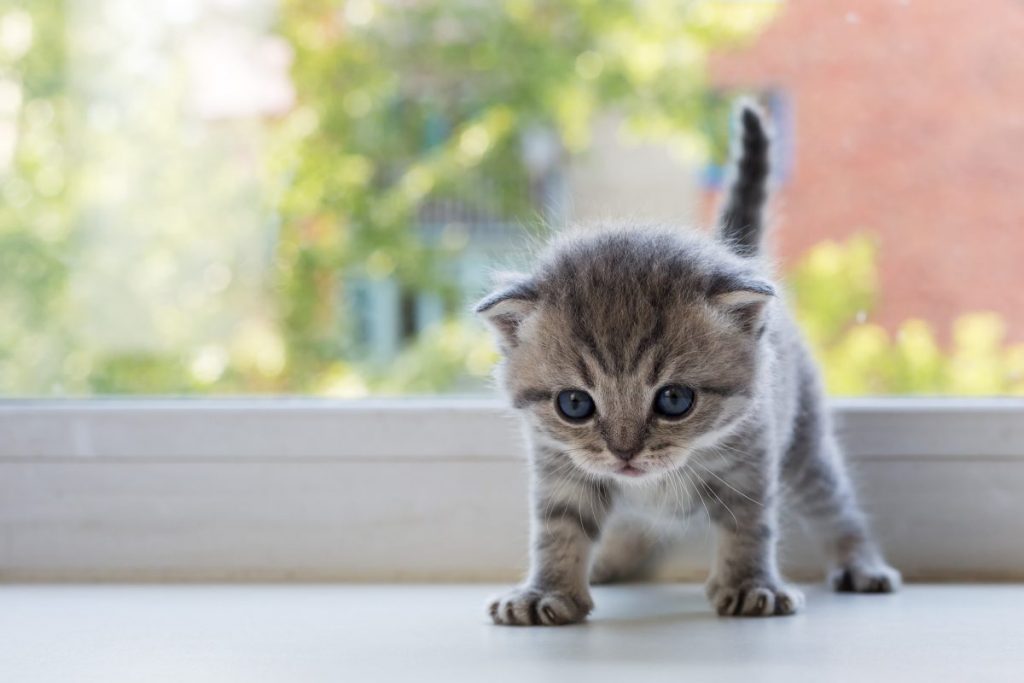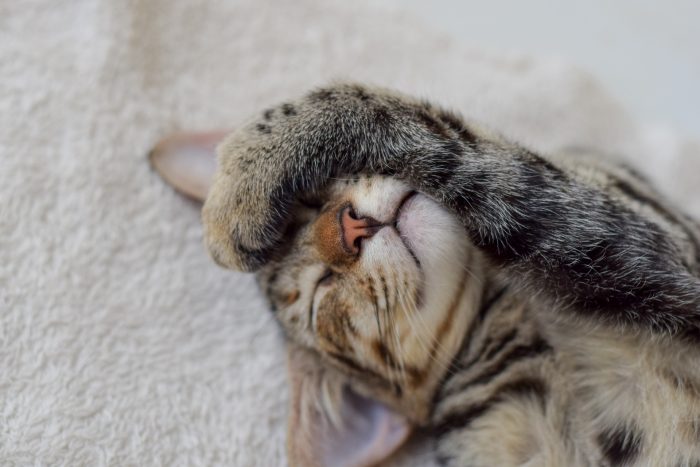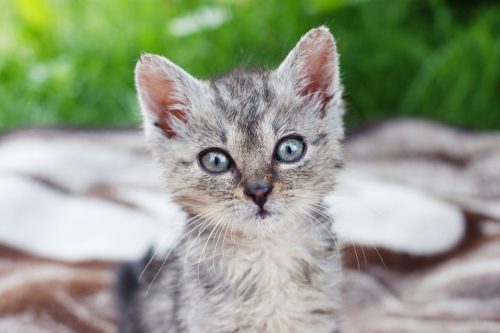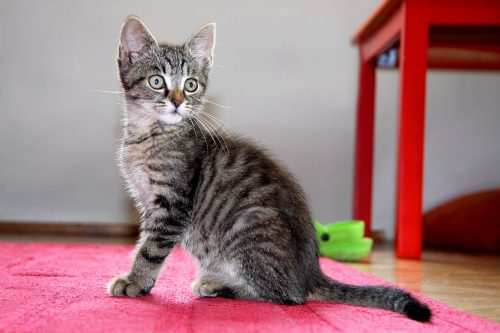You may not realize it, but felines can experience anxiety too, just like people. Kittens especially, much like children, can suffer from feelings of anxiousness and stress that can stem from a variety of sources.
Common causes of anxiety in cats include trauma or illness, a litter box that is dirty or not ‘private’, a safe sleeping spot, and even bullying by other cats if you have more than one.
Other Causes of Kitten Anxiety
Most often, kittens who display an anxious mentality do so because of genes, and/or a lack of care and socialization with people early on. Kittens that have not received early socialization are often feral and will behave accordingly.
Dealing with a feral kitten can be difficult to overcome. Patience is the name of the game, and you may not always be successful.
Sometimes felines can suffer from phobias, typically caused by a very specific stimulus. Think loud noises like thunderstorms and fireworks. With phobias, a kitten’s response will be immediate and can result in severe anxiety. Your cat may yowl and pace, defecate in places he or she shouldn’t, or hide. Phobias can also be difficult to overcome, but not impossible.
General anxiety, however, is a bit different. Cat anxiety doesn’t tend to manifest immediately, it’s more similar to a sense of anticipation of danger. This fear or ‘anticipation’ may manifest with specific behaviors and some of them may be similar to a phobia response.
Sometimes kittens that are experiencing underlying health issues can feel anxious. Since a cat can’t come right out and say something hurts, or they feel bad, they could express their feelings with clingy behavior or fearful antics like hiding. If you can find and resolve any underlying any health issues, you could also resolve their anxiety.
Stress, of course, is also a big factor in anxiety. Just like people, cats have physiological responses to outside stressors, and how well a kitten adjusts to those things just depends on their nature, how they have been raised and socialized, and genetics. Certain breeds may be more geared to anxiety and a nervous nature than others.
Think of things within your environment that might cause you stress – it is possible they also cause your critter stress as well.
A Happy Cat
A happy cat generally will sleep, patrol, hunt, groom, and sleep again. And they will usually pepper that with eating, of course. If any of these things are missing in a cat’s day to day routine, it can trigger a stress response. Sometimes cats are just prone to anxiety because of their nature.
Much like dogs, cats have their own unique personalities, with quirks and idiosyncratic behaviors specific to them. They have likes and dislikes, including their likes and dislikes of people, situations, places and things.
More often than not, cats that have been properly socialized are confident and even bold and fearless. However, kittens that have not been socialized well could become timid and even reclusive. Cats that have not been socialized at all are often feral and behave more like a wild animal than a domestic house pet.
When a kitten isn’t properly socialized, and exposed to normal day-to-day life among people, he can develop behavior problems, or a fearful nature and run from the oddest things, even stuff that we see as benign.
Fight or Flight
Most felines have a pretty well-developed survival instinct, even at a very young age and tend to err on the side of caution in their behavior. It’s just the way cats are wired. More often than not, their response to a real or perceived threat is to flee and/or hide, rather than fight.
Sometimes, if your feline has a ‘nervous Nelly’ nature, even with adequate socialization, they can still experience stress and anxiety, and respond with anxiousness to the world around them.
Fear-based behavior is a bit more intense and can arise from anxiety if your kitten decides a threat is dangerous. Fear is what triggers the fight or flight response and gives your kitten that rush of adrenaline. When they experience that rush of adrenaline, it’s what pushes them to run and escape the danger.
It’s a good idea to remember that cats are relatively solitary creatures. If there is a danger that presents itself, a cat doesn’t have a ‘pack’ to back him up. So, they resort to running and seeking a safe place to hide until the ‘danger’ passes.
When Does Kitten Anxiety Develop?
For most pets, anxiety and phobias tend to begin to develop between the ages of one and three. Sometimes it could happen earlier, around eight months of age or so, but it’s not as common and the cause is usually not known.
When there is a specific cause, it’s often related to being separated from their owner (cat separation anxiety), trauma, loud noises (noise phobia), or poor socialization with humans and other animals.
Separation Anxiety in Kittens
Kittens that have been well-socialized may experience separation anxiety disorder when they are left alone. While cats are commonly thought to be independent and anti-social, that’s not actually the case. Cats are capable of forming very strong bonds and attachments to their owner just like dogs do, and being left alone can cause cat separation anxiety.
It’s important that you teach your kitten to be alone starting at a young age and watch carefully for signs of separation anxiety in cats. It may not be as obvious as with a dog, since cats don’t bark and howl. Practice leaving your little cuddle buddy in a room that is safe and stocked with a litter box and food and water for short periods of time, and gradually increase the times when you see they are adjusting well.
Kitten Anxiety Symptoms
It depends on your cat, but if your kitten is suffering from mild fear, they may hide, withdraw, tremble, or not be as active as you might expect.
If your feline is experiencing panic, they will actively try to escape whatever is causing the reaction, even to the point of injuring or harming themselves.
Much like humans, sometimes kittens can experience bowel problems as a response to constant stress and anxiety, or exhibit behaviors such as biting and licking themselves. Excessive grooming can also sometimes be a problem. This can get so extreme your kitty could wind up bald in large patches due to their compulsive behavior.
If you have a kitten younger than 14 weeks and they have not been properly handled and socialized with enough human contact, it can cause anxiety and fearful behaviors.
Other symptoms of separation anxiety in kittens include destructive behavior like defecating and inappropriate urination somewhere other than their litter box. They will often do this on things that smell like you, such as your clothes or in your bed. It’s easy to think your cat is just misbehaving or being spiteful when they do this, however that’s inaccurate.
It’s actually a way for an anxious cat to soothe themselves by mixing your scents together (think along the lines of a baby being attached to a favorite blanket) and also a way for them to leave a ‘trail’ of sorts, so their human parent can find their way back home.
Meowing and excessive vocalization is a sign of an agitated cat, as well as frequent vomiting. Sometimes a cat may claw or scratch at things and shun their food, resulting in weight loss and even anorexia.
Also, a lack of regular play and stimulation with people can leave your cat feeling anxious and bored. Always remember that while cats can seem to be very independent, they still bond and form attachments and crave social interaction with their pet owners.
Tips to Alleviate Kitten Anxiety
Cats love high places. High places make them feel safe. It’s why an outside cat will race to the first tree they can find to escape danger. And it is why indoor cats will often sleep in high places like window seals, on top of the fridge, on the back of a chair or couch, perched on your dresser, and wherever else they can climb to for an afternoon snooze.
Provide high places for your kitten to explore and hide in, and they will be all the happier for it. Consider things like cat perches, cat trees, and cat furniture designed to offer them stimulation, as well as a ‘safe’ resting place.
This is especially important if you have more than one cat, as sometimes other cats like to bully their compatriots. If you have more than one cat, it’s also a good idea to have multiple food and water bowls, as well as multiple litter boxes. This helps your cat avoid confrontation and feel more secure.
If your kitty has a bed, make sure it’s not enclosed and doesn’t make them feel cornered. They like to sleep in a safe place with an easy escape route should ‘danger’ arise.
Remember to give your kitty lots of love and attention, as they enjoy spending time with you, and they view the love and attention as ‘safe’.
Provide an environment for your feline that fosters their sense of adventure and curiosity, and satisfies their need to hunt and stalk prey. Puzzle feeders can provide great entertainment while you are away, and a bird feeder on the back porch that your cat can see from their cat tree is always a great entertainment.
The more ‘cat’ friendly your kitty’s environment is, the better off your cat will be, especially while you are away and they are left to their own devices.
Practice ‘positive reinforcement’. Pet them and reward them with treats when they are playing or being quiet, and ignore them for displaying poor behaviors like yowling and excessive meowing.
Remember that cats are just as sensitive to emotions as dogs, so the calmer and more relaxed you are, the calmer and more relaxed your cat will be.
Consider leaving a TV or music on when you leave the house. There are even DVD’s you can get that showcase different animals and prey that can be very entertaining for your feline and keep them distracted from any anxiety woes they may experience in your absence.
Sometimes a kitten just can’t get past feelings of anxiety and you might need to consider taking them to the veterinarian if a problem persists.
Finally, make time to play with your cat often, at least two or three times a day. Cats experience great joy when they are able to do what they are created to do, such as hunt and stalk their prey. When you play with them and allow them to satisfy those desires, it makes for a very happy cat, improving their health and well-being.








